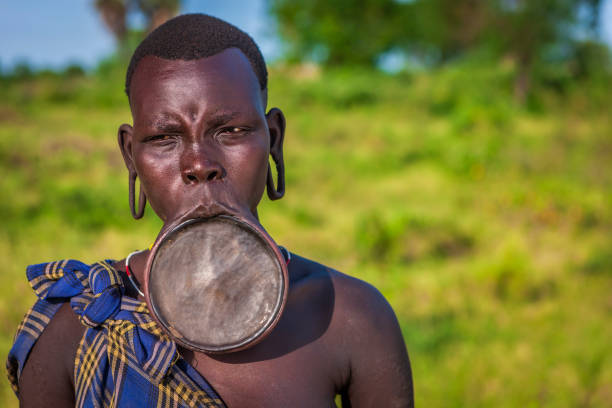Known For: Beekeeping, river navigation, rainmaking rituals, and peaceful coexistence with neighboring tribes
The Kwegu Tribe, also known as the Muguji, is one of the smallest and least-known ethnic groups of Ethiopia’s Omo Valley. They live along the confluence of the Mago and Omo Rivers, often intermingling with the Mursi, Karo, and Nyangatom. Though small in number, the Kwegu (Muguji) have a distinct and vibrant culture deeply connected to the riverine landscape, traditional crafts, and spiritual ceremonies.
Beekeeping & River Life
The Kwegu (Muguji) are renowned for their traditional beekeeping. Men craft hives (called wera) from brushwood and bark, covering them in grass and hanging them high in trees near the river. Each man may manage up to 20 hives, making honey a crucial part of both their diet and economy.
They also build Gaggi, wooden canoes carved from fig trees and other large species. These boats, capable of holding up to ten people, are their primary transportation along the Omo River, steered by long Y-shaped poles.
Diet & Daily Living
The Kwegu diet includes dry porridge or flatbread made from sorghum and maize, along with milk, boiled coffee, and large quantities of honey. Their subsistence lifestyle reflects a deep reliance on the natural environment.
Appearance & Clothing
Kwegu women traditionally shave their heads with razor blades and wear lip plugs and handcrafted leather dresses adorned with beads, nails, and shells. While the women are more decorative, the men wear simpler attire, often forgoing the elaborate adornment seen in neighboring tribes.
Marriage & Kinship
Marriage among the Kwegu (Muguji) is primarily consensual, and abduction is considered taboo, setting them apart from many other groups in the Omo Valley. Intermarriage with the Karo and Mursi is common, and helps foster peaceful relationships.
Ceremonies & Cultural Practices
- Rainmaking Ritual (Werkagutu Qebento): A spiritual leader is dipped into the Omo River during times of drought to invoke rain, followed by offerings of milk, honey, and sorghum beer (borde). A ritual to stop heavy rain uses symbolic mud placed inside the rainmaker’s home.
- Hunting (Adema): Before group hunts, participants receive a blessing from village elders. Grievances among hunters are resolved before departure to ensure unity and success.
- Circumcision (Qorin): Boys aged 7–8 undergo circumcision while living in special huts outside the village. After the ceremony, each boy returns to his home accompanied by family.
Relations with Other Tribes
The Kwegu (Muguji) are widely respected for their peaceful nature. They maintain strong social and trade relationships with the Karo, Mursi, and Nyangatom. Intermarriage, shared rituals, and river trade continue to strengthen these bonds.
Visit the Kwegu (Muguji) with Omo Region Tours
Explore the cultural depth of Ethiopia’s remotest communities with the #1-rated local operator on TripAdvisor. Our expert guides offer authentic access to the Kwegu (Muguji) tribe and other unique groups throughout the Omo Valley.

